|
|
|
Sort Order |
|
|
|
Items / Page
|
|
|
|
|
|
|
| Srl | Item |
| 1 |
ID:
180894
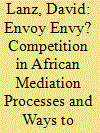

|
|
|
|
|
| Summary/Abstract |
This article seeks to make sense of the dynamics of competition in African mediation processes and to outline approaches for effective cooperation between mediators. To this end, it analyzes four cases of recent peace processes: Sudan (1994–2005), Kenya (2008), Madagascar (2009–2013) and South Sudan (2013–2015). The article identifies four driving forces of competition among mediators: clashing interests of states involved in mediation, overlapping mediation mandates, incompatible norms guiding conflict resolution, and mediators’ lack of performance. These factors risk undermining peace processes unless the involved mediators and guarantors take active steps to mitigate the negative effects of competition. This can be done through ‘hierarchical coordination,’ where a recognized authority takes the lead and allocates roles to other actors, or through ‘collaborative cooperation,’ where partners have unity of purpose and decide on a division of labor based on comparative strengths.
|
|
|
|
|
|
|
|
|
|
|
|
|
|
|
|
| 2 |
ID:
180887


|
|
|
|
|
| Summary/Abstract |
Completed negotiations often end in shortfalls, half glasses, and way stations. Is that enough to claim success and is a half-loaf sometimes sufficient? The nine articles in this thematic issue examine various forms of incomplete negotiations, from a full-worded agreement that is bypassed, through a formal ceasefire, an agreement among only the agreeables, a mediated but non-transforming agreement, a confidence-building agreement, and finally, claimed resolution that drives violence underground. Sufficiency has different meanings in each case, but generally refers to making some progress in handling the conflict, whereas insufficiency refers to not making progress at any level that is lasting.
|
|
|
|
|
|
|
|
|
|
|
|
|
|
|
|
| 3 |
ID:
180888
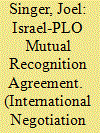

|
|
|
|
|
| Summary/Abstract |
From the perspective of a practitioner who was deeply engaged in the negotiations, this article describes how the Israeli-Palestinian Mutual Recognition Agreement was conceived and negotiated. It explains the process of convincing Israeli and Palestinian leaders to accept mutual recognition, overcoming their initial objections. While not nearly as publicized as the 1993 Declaration of Principles agreed at Oslo, this Agreement became the bedrock for all the Oslo Accords, and set the stage for subsequent negotiations.
|
|
|
|
|
|
|
|
|
|
|
|
|
|
|
|
| 4 |
ID:
180893
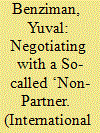

|
|
|
|
|
| Summary/Abstract |
There are conflicts in which the opposing sides perceive and define their adversary as a “non-partner” with whom they are unable or unwilling to negotiate. However, notwithstanding this reciprocal mistrust, negotiate they do. This research fills a theoretical gap in the study of negotiations by mapping five distinct practices of negotiations with a so-called non-partner: firstly, negotiate while claiming that no negotiations are taking place; secondly, use third parties as mediators or what I term “mediators+”; thirdly, negotiate agreements “over the head” of the so-called non-partner; fourthly, act unilaterally; and fifthly, negotiate relatively minor issues. Two alternative negotiation practices are also discussed: one is to negotiate agreements in non-related conflicts that may eventually influence the conflict actually on the table, and the other is to negotiate within the ingroup on the nature of negotiations should they take place. This study uses the Israeli-Palestinian conflict as a test case.
|
|
|
|
|
|
|
|
|
|
|
|
|
|
|
|
| 5 |
ID:
180891
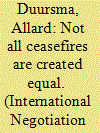

|
|
|
|
|
| Summary/Abstract |
Past research has found that third party pressure makes the signing of a ceasefire more likely, but also more likely to break down. What explains this variation? I argue that third party pressure is more likely to lead to a durable ceasefire if pressure is applied to persuade the conflict parties to continue to negotiate and produce a detailed ceasefire document, whereas pressure solely aimed at making the conflict parties sign a ceasefire document undermines the durability of the ceasefire. A comparison of four ceasefires concluded in Sudan supports this argument. Third party pressure that led to the Nuba Mountains Ceasefire and the Agreement on Security Arrangements helped move the negotiations on security arrangements forward. By contrast, the N’Djamena Ceasefire Agreement and the Darfur Peace Agreement were imposed on the parties without regard for political and technical aspects of the ceasefire. This explains why violence soon resumed.
|
|
|
|
|
|
|
|
|
|
|
|
|
|
|
|
| 6 |
ID:
180895


|
|
|
|
|
| Summary/Abstract |
This study considers the challenge of operating a regional association that includes combatants and adversaries as members, and the response to such challenges. Conflict type, defined by intensity and duration, is located on the vertical axis, and engagement level (international, regional and bilateral) is fixed along the horizontal axis, to distinguish the conditions supporting confidence-building (one of many peacebuilding approaches). The utility of this framework is examined by applying it to the Union for the Mediterranean – a 42-member association operating in a region where conflict is prevalent (Syrian war, Arab – Israeli conflict, Greece – Turkey conflict, and Algeria – Morocco conflict). The study concludes that confidence-building has relevance to hot and cold intractable conflict but not to contemporary war. Curiously, the intractable conflict literature rarely discusses confidence-building and the Euromed literature does not characterize EU behavior in a confidence-building context. The study builds a research agenda to further examine the confidence-building framework.
|
|
|
|
|
|
|
|
|
|
|
|
|
|
|
|
| 7 |
ID:
180892


|
|
|
|
|
| Summary/Abstract |
Peace referendums can be exploited by political actors who may gain politically from opposing a peace process. This article explores how political opposition affects peace negotiations, particularly when a referendum is used to ratify an agreement, through the study of the Colombian peace negotiations between the government of President Santos and the Revolutionary Armed Forces of Colombia (FARC). It finds that the exclusive character of the negotiations, coupled with their confidentiality, contributed to the political opposition’s capacity to influence public opinion against the peace process and to reject the peace agreement in the 2016 referendum. This qualitative study is based on the content analysis of reports, memoirs and interviews with key negotiation delegates, journalists and representatives of the referendum campaigns. It argues that political inclusion in peace negotiations can help prevent referendum spoiling, while public information and education during the negotiations can reduce the impact of disinformation and manipulation campaigns.
|
|
|
|
|
|
|
|
|
|
|
|
|
|
|
|
| 8 |
ID:
180896
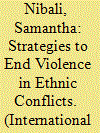

|
|
|
|
|
| Summary/Abstract |
After decades of violent separatist conflict between the Russian Federation and the Chechen Republic, Russian President Vladimir Putin declared the region stabilized and peaceful in 2008. Despite this grand proclamation of peace, Chechnya today operates under an environment of violent repression and the conflict remains un-managed. This article argues that a threshold of sufficiency exists which settlement strategies must pass to achieve peace. While a perceived peace may occur when the armed conflict ends, without sufficient management strategies the identity-based roots of the conflict will manifest in other forms beneath the surface. By examining co-optation, power-sharing, autonomy and reconciliation, this research finds that while Russia’s incomplete conflict management strategy may have ended the violent insurgency within Chechnya, the failure to apply these principles sufficiently has allowed violence to continue. This research hopes to be applicable in informing strategies to resolve conflicts in multi-ethnic states within and beyond the North Caucasus.
|
|
|
|
|
|
|
|
|
|
|
|
|
|
|
|
| 9 |
ID:
180889


|
|
|
|
|
| Summary/Abstract |
This article tells the story of how and why, when negotiating the Israeli-Palestinian Oslo Accords in 1993–95, the author developed the concept of dividing the West Bank into three areas with differing formulas for allocating responsibilities between Israel and the Palestinian Authority in each. The origin of how these areas were named is also discussed. This negotiation demonstrates that parties are prepared to modify ideological positions when detailed and practical options are presented that constitute a hybrid to the parties’ former positions.
|
|
|
|
|
|
|
|
|
|
|
|
|
|
|
|
| 10 |
ID:
180890
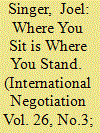

|
|
|
|
|
| Summary/Abstract |
This article analyzes one procedural prenegotiation issue that may seem minor in comparison to the substantive questions at hand, but can become consequential regarding its impact on the negotiation and its outcome. How the negotiating table is configured and where the parties will sit is the focus of our analysis. We examine how these questions were addressed in advance of key Vietnam and Middle East peace talks. The study assesses various strategies that were employed effectively to blur potential visual manifestations of symbolic and precedential advantage by one side.
|
|
|
|
|
|
|
|
|
|
|
|
|
|
|
|
|
|
|
|
|